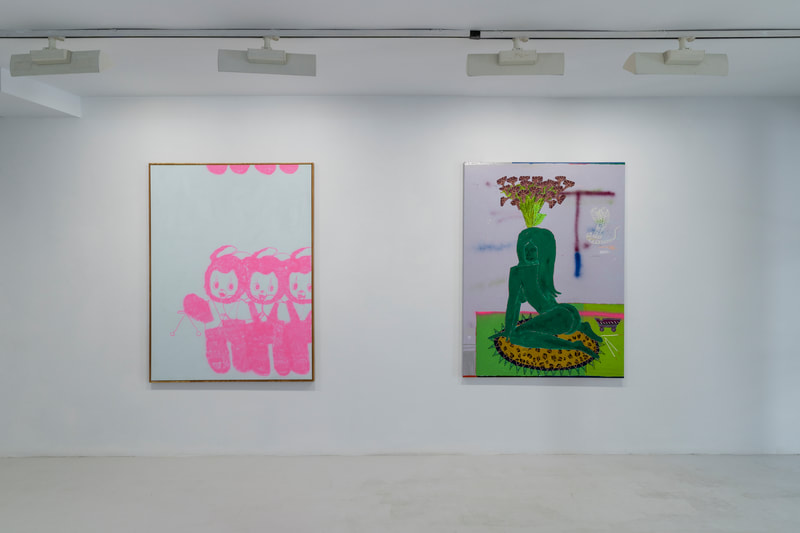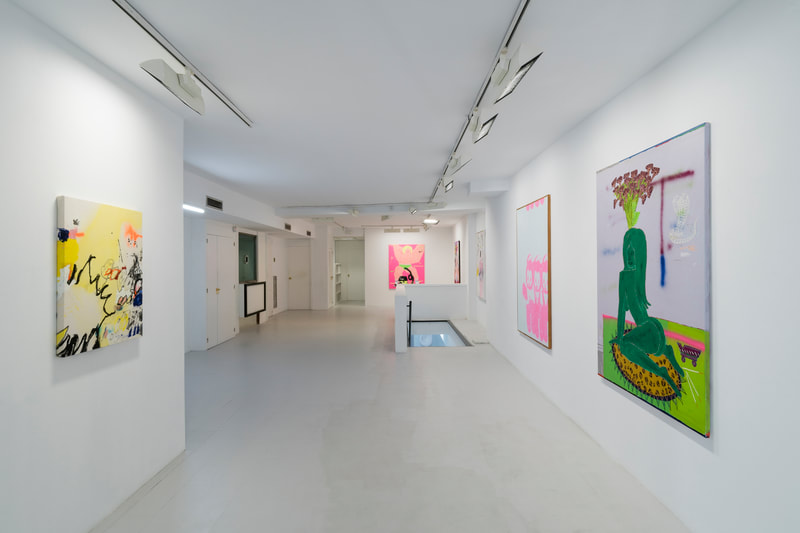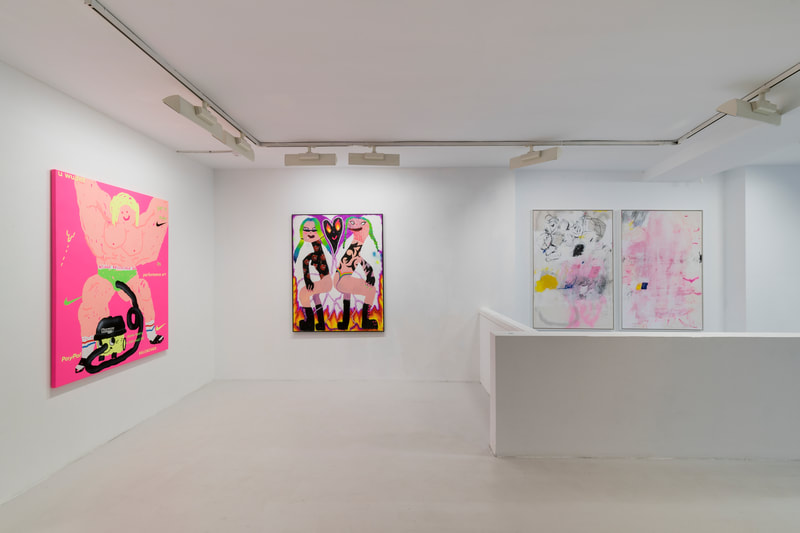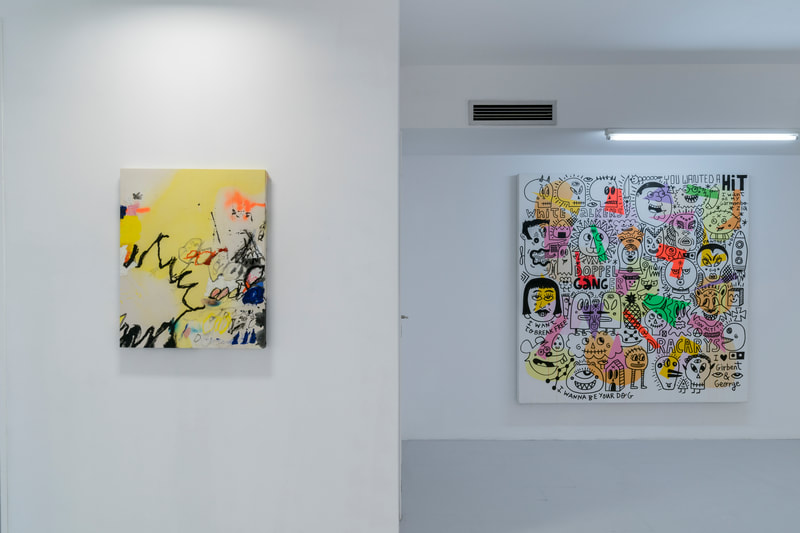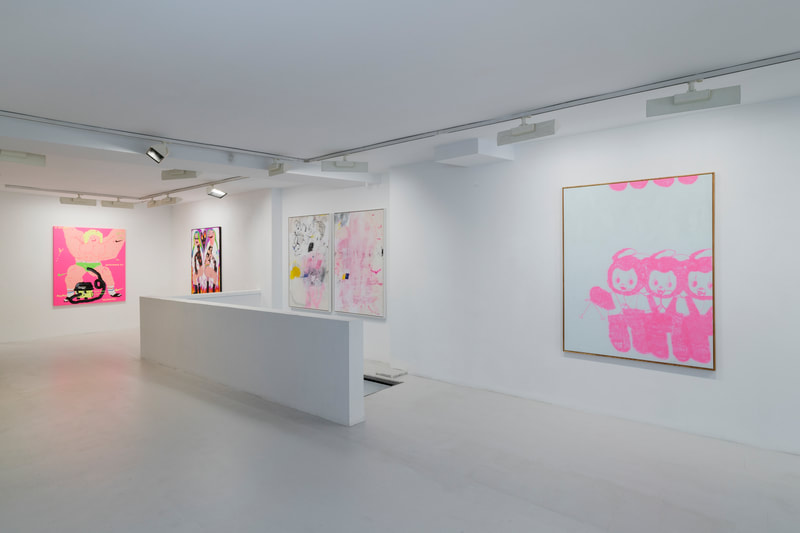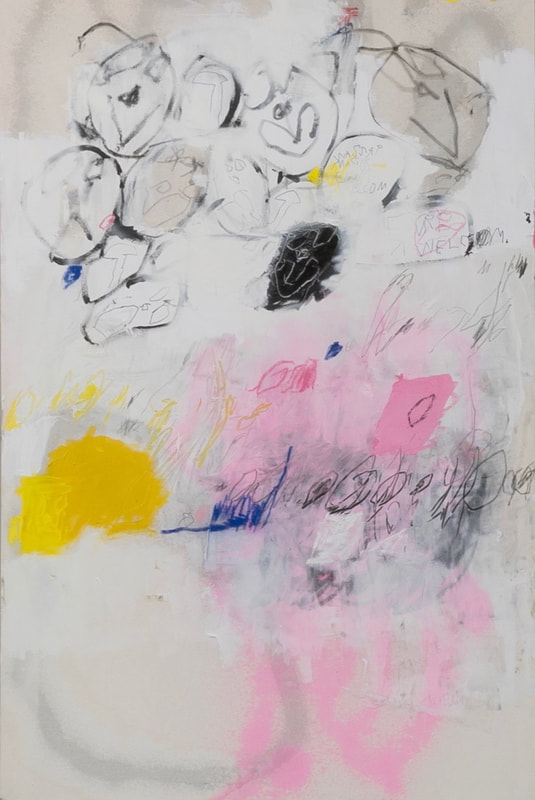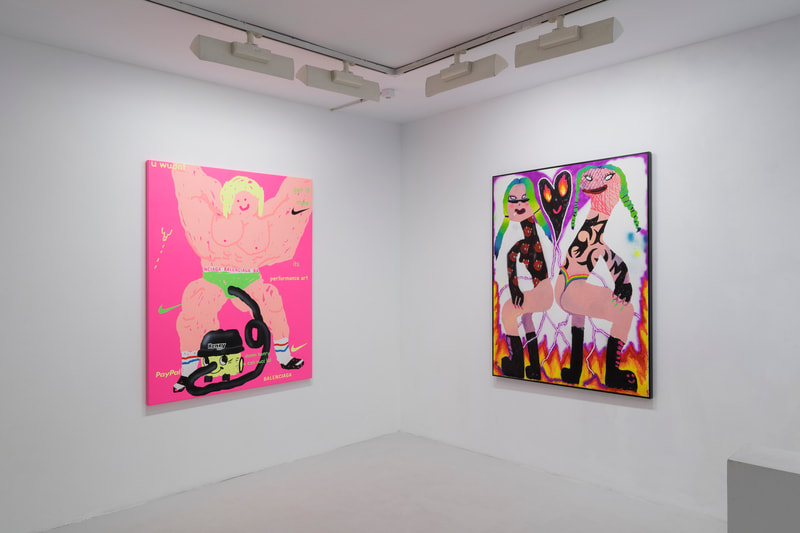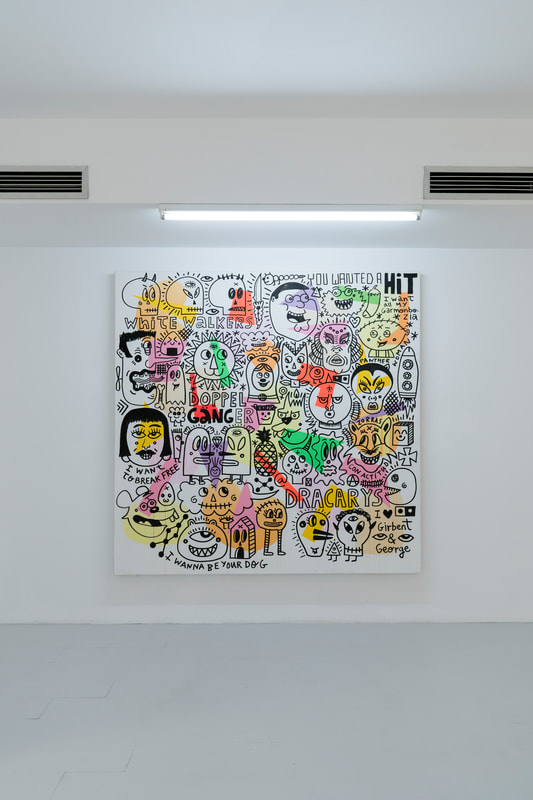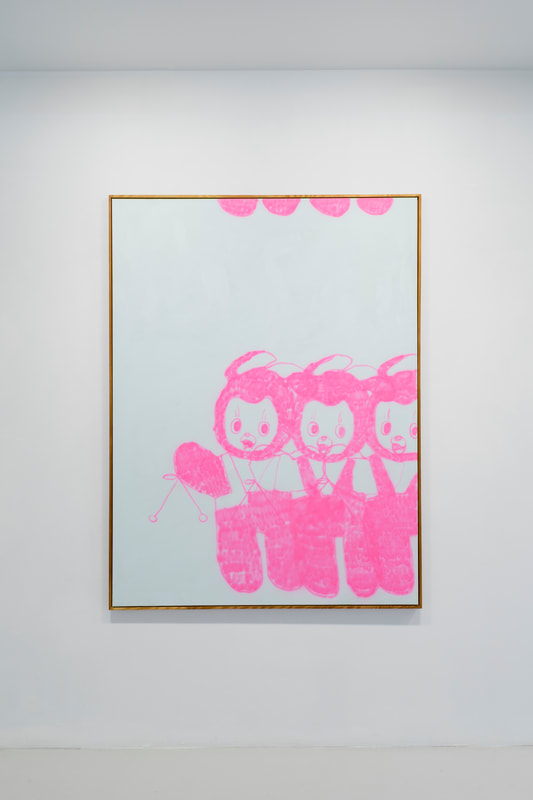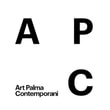HEY! FOLLOW ME! IT'S HAPPY HOUR TIME!
17 DECEMBER 2020 - 12 MARCH 2021
Jordy Kerwick, Marria Pratts, Albert Pinya, Mike Okay, Bel Fullana, Philip Gerald
17 DECEMBER 2020 - 12 MARCH 2021
Jordy Kerwick, Marria Pratts, Albert Pinya, Mike Okay, Bel Fullana, Philip Gerald
During a historical time when we can’t meet, party and make any noise, where hygiene and order prevails over chaos and fun, “Hey! Follow me! It’s Happy Hour Time!” wants to change the situation for a while. Bel Fullana, Jordy Kerwick, Albert Pinya, Mike Okay, Marria Pratts and Philip Gerald introduces us into a toddler, uninterested, absurd and thug exhibition ambient. This collective reimagine the “happy hour” concept –a pub/restaurant promotion where determinates drinks are cheaper to gain clients- as a happy and fresh place designed for fun.
We could say that these pieces of art are not judging the reality, but they are observing it from a childish and ironic perspective. In other words, like a child draws or paints what is he/she sees just to express the feelings. Their natural optimism add to the nuance.
As if the paintings were the guests, these pieces from six artists of different nationalities are reunited to celebrate everything and nothing at the same time. They try to ease this actual situation using naïve strokes, imperfect shapes, bright colors and themes that may result in the absurd. Each guest adds their own personality:
Bel Fullana (Majorca, 1985) pushes the envelope of 21st century aesthetics: trap, reggaeton, “posing” on social media. She represents girls with fishnet stockings, bikinis, tattoos and fire. These characters are erotically posing in front of a camera as if it is the artist’s stroke. They are portrayed sarcastically flaunting today’s stereotypes.
Marria Prats (Barcelona, 1988) shows us what we can find observing the cities, streets and society. Her works constantly remark today’s dilemmas and incoherencies interpreting from a positive point of view, searching for beauty and optimism using the insignificant details of our life.
Albert Pinya (Palma, 1985) uses naïve strokes to reflect the relationships between society and the environment. His work constantly reveals pop’s culture doing compositions full of horror vacui turning his work into a communicably element. He rejects “l’art pour l’art” claiming the expressive role of art. His ironical and intentionally naive aesthetic are his footprint.
Philip Gerald (Ireland, 1992) claims that which is useless and just playful through plain-fluorescents colors, excessive pithy faces and ambiguous figures created from an inchoate image editing program. His work creates a visual dilemma where the digital world is relocated older mechanisms. Carefree scenes, daring characters and bright colors are all part of his style.
Mike Okay (Germany, 1980) shows the tiny world that exists in a toddler’s room from in 80’s Berlin. His imperfect stroke simulates a child’s hand drawing; matchbox cars’, teddies and animals’ figures coexisting with his belongings. The way he draws them, with regards to the materials and sizes, give a new narrative to his childish toys giving them a pictorical approach adapted to the artistic modern art.
Jordy Kerwick (Auatralia, 1982) translated the tridimensional world into bidimensional images from plain colors, crude strokes and sharp angles. His painting is between abstract and figurative, still life related to his surrounding world -home and daily objects-. The technical mix proves his shape and color’s understanding adding innocence and sincerity to his creations.
The paintings of these six artists are coexisting in this exposition. It aims to transmit spontaneity and good vibes which lead to the creation of a positive ambience through this diversity. This creates our “happy hour” where fun and laughter are priorities.
Text by Belén Martínez
We could say that these pieces of art are not judging the reality, but they are observing it from a childish and ironic perspective. In other words, like a child draws or paints what is he/she sees just to express the feelings. Their natural optimism add to the nuance.
As if the paintings were the guests, these pieces from six artists of different nationalities are reunited to celebrate everything and nothing at the same time. They try to ease this actual situation using naïve strokes, imperfect shapes, bright colors and themes that may result in the absurd. Each guest adds their own personality:
Bel Fullana (Majorca, 1985) pushes the envelope of 21st century aesthetics: trap, reggaeton, “posing” on social media. She represents girls with fishnet stockings, bikinis, tattoos and fire. These characters are erotically posing in front of a camera as if it is the artist’s stroke. They are portrayed sarcastically flaunting today’s stereotypes.
Marria Prats (Barcelona, 1988) shows us what we can find observing the cities, streets and society. Her works constantly remark today’s dilemmas and incoherencies interpreting from a positive point of view, searching for beauty and optimism using the insignificant details of our life.
Albert Pinya (Palma, 1985) uses naïve strokes to reflect the relationships between society and the environment. His work constantly reveals pop’s culture doing compositions full of horror vacui turning his work into a communicably element. He rejects “l’art pour l’art” claiming the expressive role of art. His ironical and intentionally naive aesthetic are his footprint.
Philip Gerald (Ireland, 1992) claims that which is useless and just playful through plain-fluorescents colors, excessive pithy faces and ambiguous figures created from an inchoate image editing program. His work creates a visual dilemma where the digital world is relocated older mechanisms. Carefree scenes, daring characters and bright colors are all part of his style.
Mike Okay (Germany, 1980) shows the tiny world that exists in a toddler’s room from in 80’s Berlin. His imperfect stroke simulates a child’s hand drawing; matchbox cars’, teddies and animals’ figures coexisting with his belongings. The way he draws them, with regards to the materials and sizes, give a new narrative to his childish toys giving them a pictorical approach adapted to the artistic modern art.
Jordy Kerwick (Auatralia, 1982) translated the tridimensional world into bidimensional images from plain colors, crude strokes and sharp angles. His painting is between abstract and figurative, still life related to his surrounding world -home and daily objects-. The technical mix proves his shape and color’s understanding adding innocence and sincerity to his creations.
The paintings of these six artists are coexisting in this exposition. It aims to transmit spontaneity and good vibes which lead to the creation of a positive ambience through this diversity. This creates our “happy hour” where fun and laughter are priorities.
Text by Belén Martínez
| full_de_sala_hey_follow_me-3.pdf |

